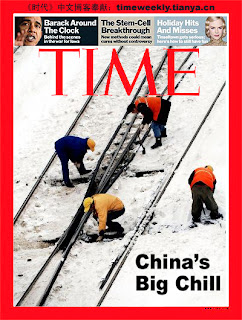
China's Big Chill
--What are the causes and why does it matter?
Half of China had been in a mess in the past two weeks. It started as a heavy snow in the south, which was rare. However, what made the biggest natural disaster is the frozen rain following the snow. Millions of people mostly migrant workers who went home for the traditional Spring Festival were stuck either at train stations (those who were lucky) or in the middle of no where along frozen railways and highways.
The head of the China Meteorological Administration apologized to the public for not forecasting the bad weather to its full extend. However, it's never easy to forecast any humanitarian disaster, especially when it is compounded by many seemingly unrelated factors.
The butterfly effect started when the national electricity company agreed on a price raise asked by the coal companies in the once a year negotiation before the winter heating season. It usually works in a way that the state council will agree on a subsequent price raise on electricity. It didn't work as expected. Under mounting pressure to stable retail price on consumer goods, the state council denied electricity company's request to raise retail electricity price. That is not exactly a disaster, but it made their profit paper thin. The electricity companies scrambled to fight the decision by making a case that they are having trouble with this new price structure. Many plants did not stock up coal storage before the winter season, and instead limiting its output wherever they see fit. TV channels and newspapers are flooded with reports of shortage of electricity. Electricity companies wished it could change the state council's mind.
And it came the perfect winter storm. The storm cut the fragile transportation network in south China. The rail system had just been upgraded to electricity system. With touch cables frozen by ice, electricity engines could no longer work. The highway system was also frozen because there's no deicing equipment at all. Airports were all frozen too. Some power transit towers were brought down, partially by the unexpected storm, and partially by poor design and construction.
As a result, a large part of China, the more active part of China is stuck in the situation that transportations were dead waiting electricity to drive. Power plants couldn't generate electricity as they do not have fuel, plus power transit towers collapsed. In the mean time, millions of people are living in the dark and drink snow collected along the road. However, what caught the headline of every newspaper is the millions of migrant workers stuck in the railway stations and on the road home for the Spring Festival.
It's a BIG deal.
It's a HUGE deal, nothing bigger to Chinese than going back home in the Spring Festival, nothing, especially to the migrant workers from rural China and work in the southern cities. They work the whole year for the day to go back home. If they couldn't, they would be mad, literally. With millions living in the dark in their cold homes and millions going insane on the street with nothing on their heads, it came the largest humanitarian disaster in modern China.
No comments:
Post a Comment